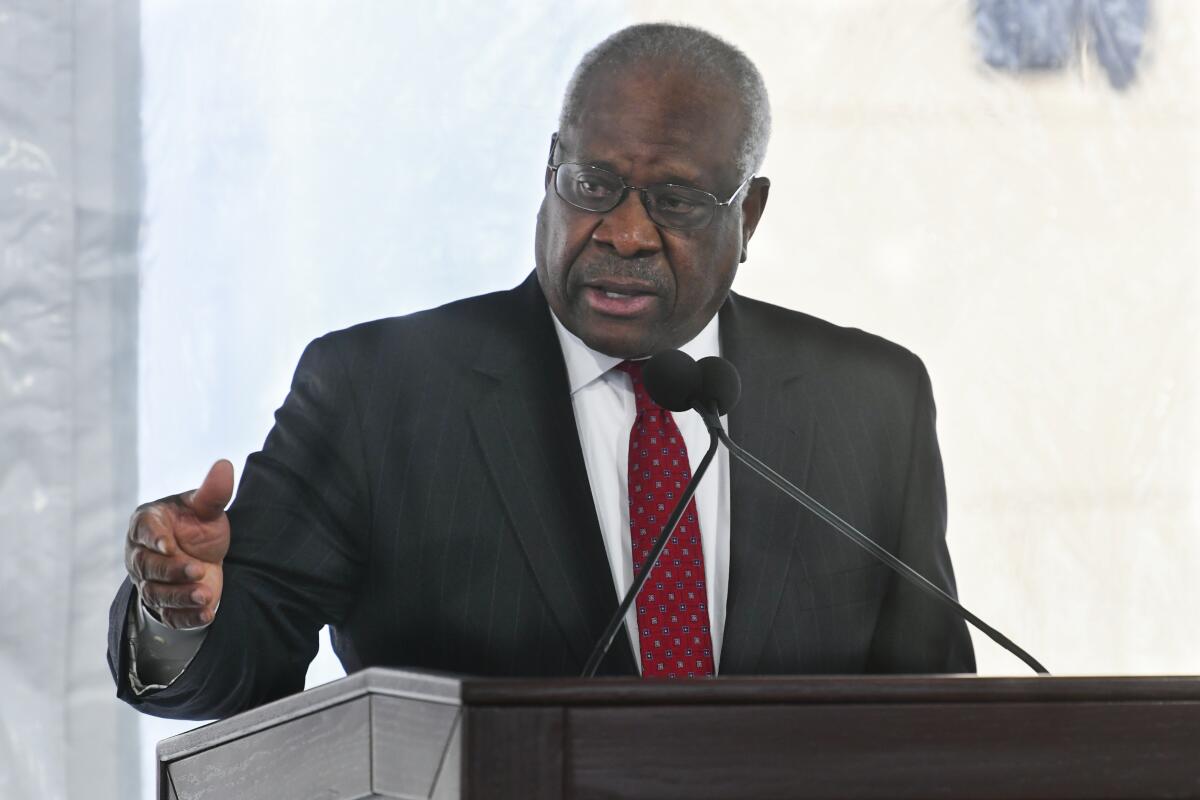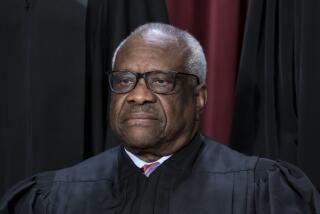Column: What does it mean that famously silent Justice Clarence Thomas is suddenly garrulous?

- Share via
The big news on the Supreme Court this term wasn’t that the justices were again weighing the constitutionality of the Affordable Care Act or that Roe vs. Wade is in jeopardy or that religious freedom and pandemic restrictions were clashing.
The big news was that Clarence Thomas was talking.
That’s right. The Supreme Court justice who once went 10 full years without asking a single question at oral arguments — the justice who sits so quietly staring blankly at the ceiling that he made national headlines in 2013 when he cracked a nearly inaudible, nine-word joke — suddenly can’t keep quiet.
In December, he noted the “sordid roots” of a Louisiana law that allows for non-unanimous jury verdicts. In April, he raised objections to a California law mandating that nonprofit groups reveal information about their donors. In November, he asked questions about the Republican challenge to Obamacare.
But those are just random examples. He’s been a regular participant in dozens of cases.
The prevailing explanation among Thomas watchers for his shocking new volubility is that he is more comfortable with the pandemic-era telephone format of the arguments, in which the justices ask questions one at a time in order of seniority, rather than butting in and interrupting whenever they choose.
But whatever it is, I’m disappointed.
While some Supreme Court watchers have faulted Thomas over the years for his taciturnity — a New Yorker article called his behavior at oral arguments “embarrassing,” “bizarre” and “disgraceful” — I’ve always thought it was to his credit that Thomas didn’t speak. It was a mark of oddity for sure, but also of distinction. He’s not a big mouth like the late Antonin Scalia, who had to show he was the smartest guy in the room, often by brusquely browbeating lawyers who appeared before the court.
If Thomas’ silence was the result of self-consciousness or “introversion” (as he himself has sometimes hinted), well, we could use more of those qualities at the top. I’m so sick of narcissists in public life who think that no subject has been adequately discussed until they themselves have participated in the droning and blathering. A little humility never hurt anyone.
For the record, I abhor Thomas’ politics — he’s far, far to the right of me — but he was onto something when he suggested that the rapid-fire questions with which the other justices interrupt attorneys in the middle of their arguments are often rude, sometimes disruptive and perhaps even unnecessary. “Let the advocates advocate,” he once said. Too often, Thomas once said, “we look like Family Feud.”
By keeping quiet, Thomas not only struck a blow for humility; he helped get everyone out the door in time for lunch.
It wasn’t like Thomas was throwing spitballs behind the chief justice’s back. Nor was he sleeping, like a judge I used to cover at New York State’s highest court. Yes, he looked at the ceiling a lot, but I prefer to think he was concentrating on the arguments rather than thinking about what had happened on the previous night’s episode of “Handmaid’s Tale.”
“It’s more in my nature to listen,” he told a group of students in 2000.
Alas, he couldn’t keep mum forever. In 2013, Thomas ended seven years of silence with a joke.
Then, in 2016, Thomas broke his 10-year no-question streak. According to the Washington Post, he hadn’t asked a single question in any of the previous 682 cases, a record in modern Supreme Court history. But just a few weeks after Scalia’s death, he burst out with a series of questions about the 2nd Amendment.
“Not since Clarence Darrow for the defense called prosecutor William Jennings Bryan himself to the stand has an American courtroom been so startled,” wrote Garrett Epps, who was in the chamber for Thomas’ historic blurt at 10:30 a.m. on Monday, Feb. 29, 2016.
The Guardian reported audible gasps. Chief Justice John Roberts swiveled his head in surprise, according to news reports.
Thomas’ questions were good ones. But then he went another three years before asking another one.
And now, at age 72 — on the eve of his 30th anniversary on the court — he’s become garrulous at every single argument, damaging his brand, in my opinion.
Of course, it is inevitable that if you remain mute for years at what are, after all, called “oral arguments,” that’s going to put added scrutiny on what you say when you do speak.
For instance, in 2013 Thomas broke his dignified silence to engage in one of the court’s favorite traditions: trading sophomoric jokes about rival schools Harvard and Yale.
At the time, all nine justices had attended either Harvard Law School or Yale Law School. (Talk about embarrassing and disgraceful.) Thomas, a Yale Law graduate, piped up unexpectedly during a discussion of whether a lawyer had provided a defendant with adequate counsel.
When it was noted that the lawyer had attended Harvard, Thomas burst out with: “Well, there, see — he did not provide good counsel.”
Now does anyone believe that was funny enough to justify breaking a hard-fought, much-criticized, 2,500-day record of silence? Reuters reported tentatively that it was “apparently a joke” — and it’s never a good sign if people aren’t sure your joke is a joke.
In 2017, two law professors published a paper that looked at Thomas differently. Instead of writing about his silence, they analyzed the questions he had asked during his three decades on the court and concluded that he should really ask more of them because, well, he’s good. Their analysis showed him to be a “Fact Stickler, Boundary Tester, Attorney Respector, Statute Parser, Insight Provider, Plain Speaker and Team Player.”
Fine. Those sound like good things. The professors encouraged Thomas to speak up more. And maybe that’s what will happen now (although if the court returns to the pre-pandemic free-for-all questioning format, don’t count on it).
But I’m with Thomas when he says he takes listening seriously. If he thinks he can do his job by listening, reading and writing opinions, he shouldn’t speak just to hear the sound of his own voice.
@Nick_Goldberg
More to Read
A cure for the common opinion
Get thought-provoking perspectives with our weekly newsletter.
You may occasionally receive promotional content from the Los Angeles Times.











